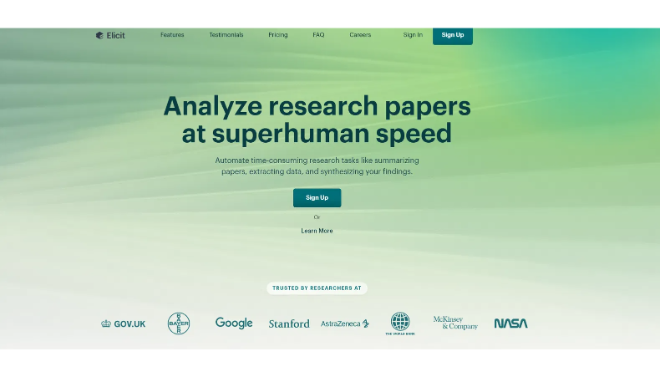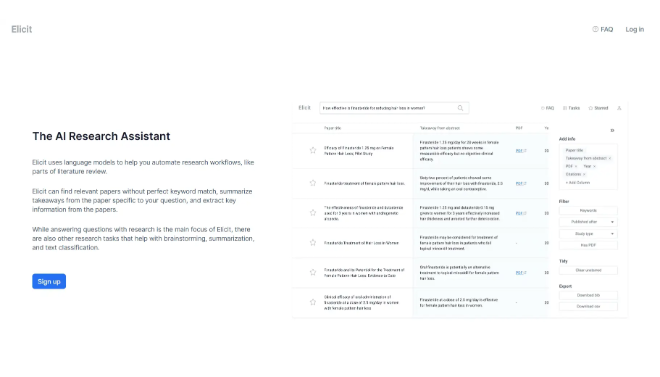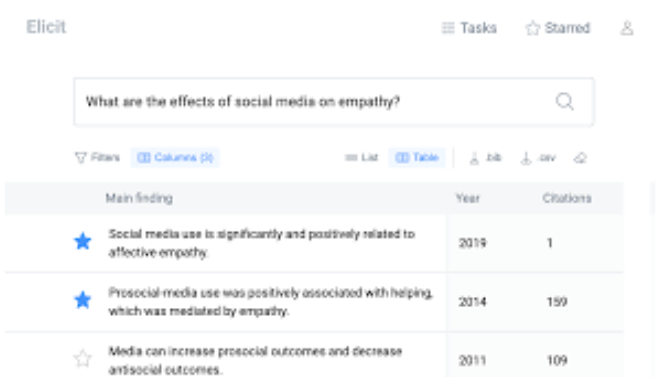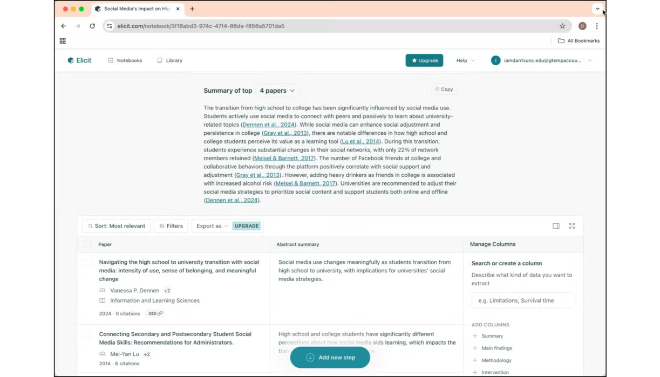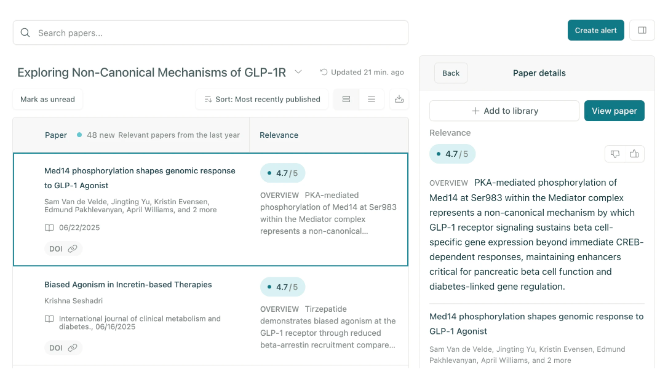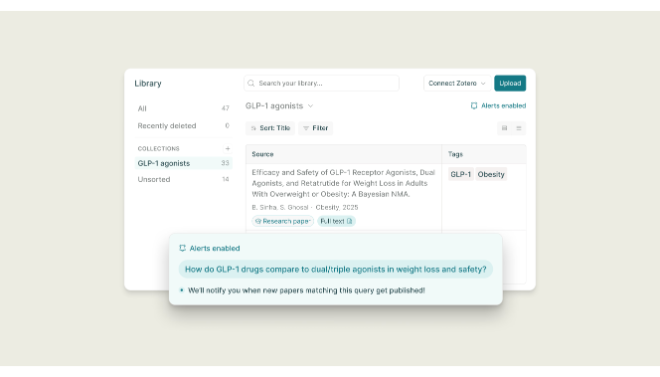Elicit is a specialized, AI-powered research tool designed to automate and accelerate critical parts of the literature review process.
Introduction
The traditional literature review is a time-consuming, tedious bottleneck in academic and professional research. Elicit was created to solve this. Co-founded by Andreas Stuhlmüller and Jungwon Byun, Elicit is not just a search engine; it’s a reasoning assistant that leverages advanced language models to turn unstructured text from scholarly papers into structured, queryable data.
Elicit’s philosophy is to minimize “grunt work” and maximize time spent on critical thinking. By starting with a research question, the platform automatically finds papers, extracts key claims, categorizes findings, and compares evidence across sources—all with transparent, source-verified links. This capability transforms the review process from hours of manual reading and note-taking into minutes of prompt engineering and data synthesis, democratizing access to complex evidence-based decision-making.
Academic Research
Literature Review
Freemium
Writing Enhancement
Evidence Synthesis
Review
Elicit is a specialized, AI-powered research tool designed to automate and accelerate critical parts of the literature review process. Unlike general-purpose chatbots, Elicit excels by performing semantic search across a massive database of over $138$ million academic papers (primarily via Semantic Scholar) and structuring the results into an interactive, customizable table. This “AI-powered spreadsheet” approach is a game-changer for evidence synthesis.
Developed by Cognition Labs, Elicit’s core strength is its focus on rigor: it provides sentence-level citations and source quotes for virtually every extracted piece of data, dramatically reducing the risk of AI hallucination. It is particularly powerful for systematic reviews, scoping reviews, and comparative analysis of empirical literature. While it may occasionally miss papers a dedicated librarian search would find and is less suited for theoretical domains, its ability to save up to $80\%$ of the time spent on screening and data extraction makes it an essential tool for academics, consultants, and researchers.
Features
Semantic Search & Discovery
Searches a database of over 138 million academic papers by understanding the intent of a natural language question, not just keywords.
Structured Data Extraction
Automatically extracts key claims, sample sizes, interventions, and outcomes from papers and organizes them into a customizable, interactive table.
Source-Verified Answers
Every piece of extracted or summarized information is backed by direct, sentence-level quotes from the source material for high trustworthiness.
Systematic Review Workflow
Dedicated workflows to guide users through the structured process of screening, inclusion/exclusion, and data extraction for systematic reviews.
PDF and Full-Text Analysis
Users can upload their own PDF documents for Elicit to analyze, summarize, and extract data from the full text.
Notebooks and Team Collaboration (Paid)
Provides a collaborative workspace for organizing research, generating evidence summaries, and allowing multiple researchers to work on the same review.
Best Suited for
Academic Researchers (Ph.D./Postdocs)
To significantly speed up the literature review phase of a thesis, dissertation, or grant proposal.
Systematic Reviewers
The ideal tool for automating the screening and data extraction steps while maintaining the rigor required for publication.
Consultants & Policy Analysts
To quickly synthesize large bodies of evidence and policy papers for evidence-based decision reports.
Students (Advanced Undergrad/Grad)
Helps in quickly scoping a topic, understanding core arguments, and generating a foundational set of cited literature.
Medical & Health Professionals
For rapidly staying current on the latest clinical trials and empirical findings in their domain.
Research Teams
Allows multiple members to collaboratively work on and audit the same literature review or evidence synthesis project.
Strengths
High Trust & Rigor
Structured Output
Significant Time Savings
Intuitive and Focused
Weakness
Incomplete Search Scope
Limited for Theoretical Work
Getting Started with Elicit: Step by Step Guide
Getting started with Elicit transforms your research question into a structured evidence table.
Step 1: Sign Up for the Free Plan
Go to the Elicit website and create a free Basic account to access unlimited search and core summarization features.
Step 2: Pose Your Research Question
Enter a natural language research question into the search bar (e.g., “What are the effects of mindfulness on professional burnout?”).
Step 3: Generate the Evidence Table
Elicit will return a list of relevant papers. Click Start synthesizing to generate an interactive table with key extracted data points.
Step 4: Customize and Extract Data
Add custom columns to the table (e.g., “Country of Study” or “Sample Size”). Elicit will use AI to fill the new columns by extracting the data from the abstracts/full-text.
Step 5: Review Sources and Export
Review the extracted data and click on any generated cell to see the direct source quote. Export your completed, structured table in formats like RIS or CSV for final analysis.
Frequently Asked Questions
Q: Can Elicit read my own uploaded research papers?
A: Yes, Elicit allows users to upload their own PDF documents for analysis, summarization, and data extraction from the full text.
Q: How accurate is Elicit's data extraction?
A: Elicit aims for an accuracy of around 80−90% but strongly advises human verification, especially for critical data points, as it provides the exact source quote to facilitate this check.
Q: What is the main difference between Elicit and ChatGPT?
A: ChatGPT is a general-purpose conversational model; Elicit is a specialized structured evidence synthesizer built on academic data, prioritizing rigor, source verification, and tabular output for research workflows.
Pricing
Elicit offers a tiered, subscription-based model with a powerful free tier for casual use.
Basic
$0/month
Unlimited search/summaries; Extract data from $20$ papers/month.
Plus
$10/month (Total: $120/year)
Everything in Basic; Extract data from $600$ papers/year; Export to RIS/BIB.
Pro
$42/month (Total: $504/year$)
Everything in Plus; Extract data from $2,400$ papers/year; Dedicated systematic review tools.
Alternatives
ResearchRabbit
A popular, free tool that builds literature networks by mapping citations, helping researchers discover relevant papers through visual connections.
SciSpace (formerly Typeset)
Focuses on deep AI interaction with user-uploaded PDFs, paraphrasing, and academic writing/formatting assistance.
Consensus
A search engine that uses AI to instantly find and distil findings directly from published scientific research, providing quick, summary-style answers.
Share it on social media:
Questions and answers of the customers
There are no questions yet. Be the first to ask a question about this product.


